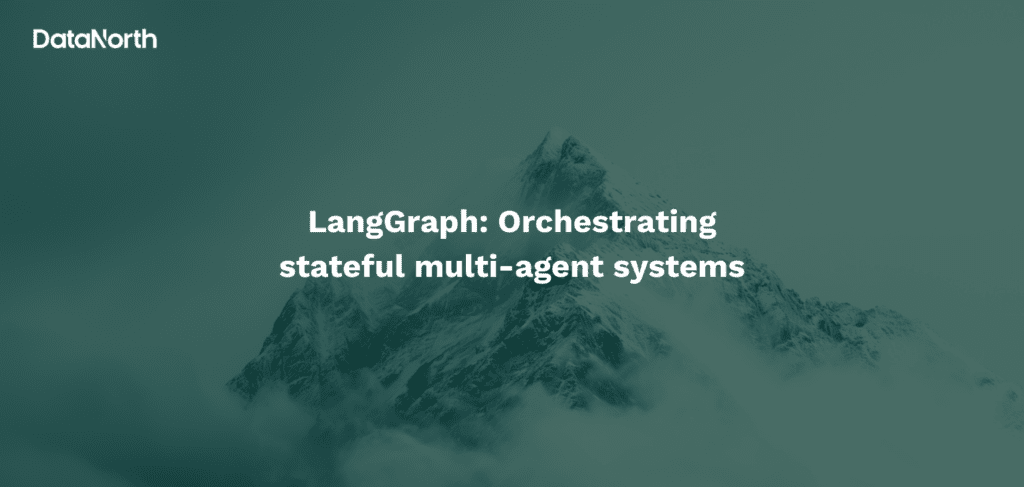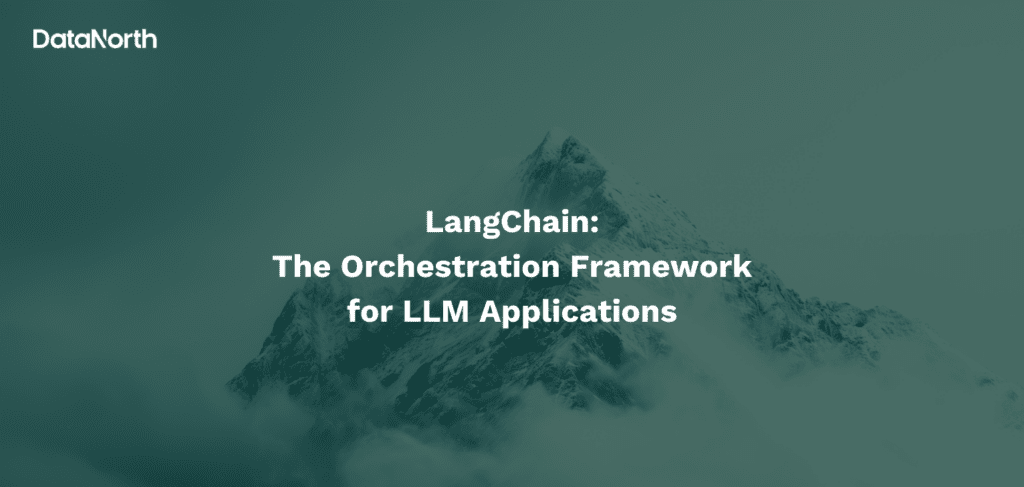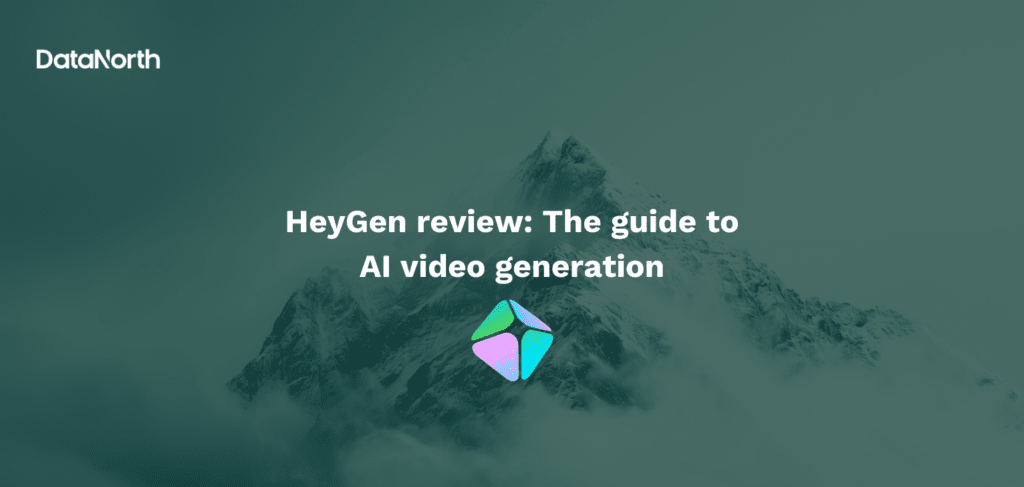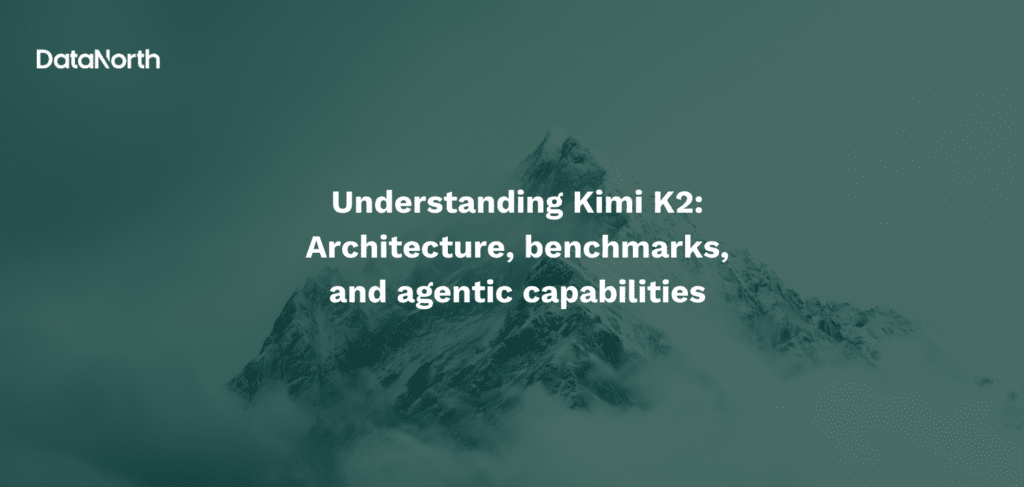Nowadays, Artificial Intelligence (AI) has a groundbreaking influence on various industries through enhancing efficiency, decreasing costs and time involved in projects, and driving innovation.
However, according to a recent Gartner report, at least 30% of Generative AI projects will be abandoned after proof of concept by the end of 2025. The reasons for this predicted failure rate can include poor data quality, lack of effective risk measures, unexpected costs, or unclear business goals.
This scenario illustrates the issues and problems that organizations implement AI solutions have, which is more alarming in regard to AI solutions where the industry changes almost on a daily basis.
In this post, we will explore the common reasons behind AI project failures and offer strategies to avoid these risks, ensuring that your organization can use the full potential of AI while avoiding the barriers that lead to failure.

Potentials of AI in Your Organization
Despite these challenges, the benefits of AI are undeniable. For instance, AI-driven companies claim to experience reduced costs and increased productivity. In healthcare, AI algorithms assist in diagnosing diseases more accurately and quickly than human practitioners. In finance, AI enhances fraud detection and risk management, helping institutions safeguard their assets.
Moreover, AI-driven analytics provide valuable insights that can improve strategic decisions and foster competitive advantages.
Given the potential of AI to revolutionize business processes, it is crucial for organizations to stay motivated in pursuing these initiatives. However, this enthusiasm must always go along with a deep understanding of the possible challenges that lie ahead.
Why do AI Projects Fail?
Even though AI has gained lots of popularity in recent years and may seem like a flawless solution to various business challenges, the reality is that the successful implementation of AI requires careful organization and supervision.
Many organizations mistakenly assume that adopting AI technology will bring immediate benefits, but this mindset often leads to disappointment.
Let’s explore the mistakes organizations make that contribute to these failures, enabling businesses to navigate the complexity of AI implementation more effectively and increase their chances of success.
Lack of Measurable and Realistic Goals
One of the biggest reasons AI projects fail is the lack of clear, measurable goals. Without a clear destination in mind, teams can get lost in the complexity of AI, drifting from task to task without knowing whether they’re moving in the right direction. How do you know if your AI project is succeeding if you haven’t defined what the success looks like? Measurable goals act as the roadmap, giving your team clear checkpoints to achieve along the way. For example, do you want the AI model to improve customer satisfaction by 20%? Or reduce operational costs by 10%?
When everyone knows exactly what success looks like, it’s easier to stay aligned and make informed decisions. Without set objectives, an AI project can feel like a never-ending experiment, with no clear sense of accomplishment or progress. This is why having those goals in place from the start is crucial to ensure AI projects deliver real, tangible value.
Unrealistic Expectations
Unrealistic expectations are another common reason why AI projects fall flat. Many organizations jump into AI thinking it will instantly transform their business, only to be disappointed when results don’t match their high ambitions. The truth is, while AI can be incredibly powerful, it’s not a magic solution—and setting expectations too high can lead to frustration, wasted resources, and ultimately, failure.
One major issue with unrealistic expectations is the belief that AI can deliver perfect, flawless results right away. In reality, AI models require time, and often, lots of high-quality data to achieve optimal performance. Expecting an AI system to work perfectly from the start can set teams up for failure. When early results don’t meet these inflated expectations, stakeholders can lose confidence in the project, even if progress is being made.
This is where DataNorth’s expertise can make a difference. Our team of AI Experts have the experience and knowledge to guide AI projects through these challenges, ensuring that the models are properly trained, and continuously optimized.
Organizational Constrains
Organizational constraints are a significant, yet often overlooked, reason why AI projects struggle to succeed. Even when the technology is sound and the use case is clear, internal barriers like a lack of resources, insufficient skills, or resistance to change can prevent AI initiatives from reaching their full potential.
Lack of Expertise
One major constraint is the lack of the right expertise within the organization. While AI promises to unlock transformative insights and efficiencies, it also requires highly specialized skills to implement and manage effectively. Without the right talent in place, organizations often find themselves struggling to build, expand, and maintain AI systems that deliver real value.
It’s not just about selecting the right algorithms or processing large amounts of data; it’s about understanding how to prepare that data and structure models to achieve business objectives. The absence of experienced data scientists, machine learning engineers, and AI specialists often leads to poorly designed models, inaccurate predictions, and, project failure.
Learning and Adoption to AI
Moreover, the fast-evolving nature of AI means that keeping up with the latest advancements requires a strong commitment to learning and adaptation. Many businesses lack the infrastructure and expertise needed to stay current with cutting-edge AI technologies, tools, and techniques, which leads to increasing the gap between what AI could achieve and what it actually delivers.
At DataNorth, we understand these challenges, which is why we offer deep expertise in AI across multiple industries. Our team of specialists can help fill the skills gap, guiding companies through each phase of the AI journey—from data preparation and model development to long-term maintenance and optimization. By partnering with us, organizations can ensure they have the right expertise to harness AI’s full potential and avoid common pitfalls that lead to project failure.
How to Avoid Your AI Project from Failing?
Successfully implementing AI projects requires more than just cutting-edge technology—it demands careful planning and the right strategies to overcome common obstacles. From unclear goals to organizational constraints, many challenges can arise along the way. However, by proactively addressing these potential pitfalls, companies can significantly increase their chances of AI success. Below are some key strategies that can help organizations navigate these challenges and achieve the full potential of AI in their business operations.
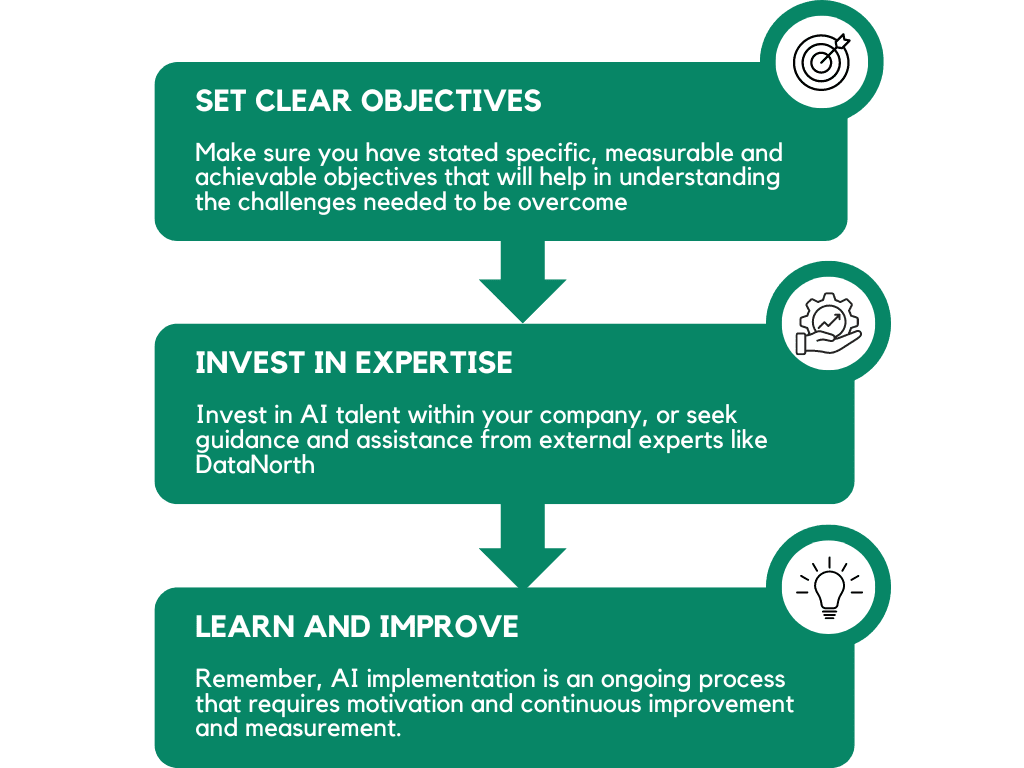
1. Define Clear Business Objectives and Adopt a Challenge-First Approach
As previously mentioned, setting clear goals is a first step anyone planning an AI project should take. The objectives should not only work as success metrics but also help in prioritizing the potentials of specific AI tools in your situation.
- What do you want to improve?
- What challenges are you striving to overcome?
By answering these questions precisely, with achievable expectations, it will become a framework for all undertaken steps during the implementation of AI in your organization. With clear goals, it is also easier to estimate what type of tools would be beneficial. When you understand the specific problems being addressed and the expected outcomes, it becomes easier to measure success and justify the investment in AI technologies.
2. Invest in the Right Expertise
AI projects require a wide range of specialized skills—from data science and machine learning to software engineering and business analysis. If these skills are lacking, AI projects can quickly break down. Organizations should invest in their own AI team development or seek external experts to fill in the gaps.
For some companies, that face financial or time constrains, getting assistance from external professionals experienced in AI is a great method for achieving the desired outcomes. This approach allows organizations to fully utilize the potential of artificial intelligence in their operations without long-term costs of hiring full-time AI specialists.
DataNorth offers a comprehensive suite of services, including AI consulting, implementation, and long-term support, helping organizations bridge the expertise gap. By partnering with experienced professionals, companies can avoid technical missteps and ensure their AI solutions deliver real value.
3. Focus on Learning and Improvement
AI systems are not a one-time investment—they require ongoing optimization and adjustment. As new data is collected, models must be retrained to ensure accuracy and relevance.
That is why continuous measurement and adjustment is a key component of an AI success. DataNorth can provide support and development services, helping organizations continuously refine and improve their AI solutions. This commitment to ongoing improvement helps organizations stay competitive in rapidly changing markets and ensures that AI systems remain valuable over time.
Get Started with Your AI Project
You just learned what are the key tricks for a successful AI journey of your company. Let’s recap what’s important:
The major reasons for AI projects’ potential risks are:
- Unclear goals that leave teams without direction
- Unrealistic expectations that lead to disappointment
- Organizational constraints that interrupt progress
To avoid these obstacles, remember to:
- Set crystal-clear objectives that guide your efforts
- Build or partner with a team of AI experts
- Adopt a mindset of continuous learning and improvement
If you find yourself needing expert guidance, consider reaching out to DataNorth. We’re here to ensure your AI initiatives not only succeed, but thrive in the long term. Let’s revolutionize your operations with AI together!


